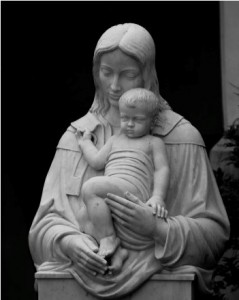The Godliness of Motherhood
by Dr. Donald DeMarco | October 23, 2012 12:01 am
 [1]
[1]Blessed Virgin Mary with Jesus
According to a Jewish proverb, “God could not be everywhere, so He made mothers.” This is a fine, enduring sentiment. I do think, however, that by reversing the statement we come closer to the truth: “God could be everywhere and proved it by creating mothers.” This image is consistent with the American novelist William Makepeace Thackeray’s remark, in Vanity Fair, that “Mother is the name for God in the lips and hearts of little children.”
A mother is not a substitute for God, but acts more like a medium that transmits God’s beneficence to others. One might object, of course, that fathers also do this. This is true enough. But there is something of special privilege about the way a mother reveals the presence of God. It is as if she had had, in some mysterious way, a face-to-face experience of God. This claim may be more plausible if we understand Mary’s role as the spiritual prototype of all mothers.
Pope Benedict XVI has made the following comment about Mary: “She who guarded in her heart the secret of divine maternity was the first to see the face of God made man in the tiny fruit of her womb.” The notion that Mary was the first human being to see the face of God is both startling and illuminating. As the spiritual role model of all mothers, something of this experience enters into both the essence of her motherhood and that of all other women who have ever given birth to a child.
If Adam and Eve regarded God the Father as austere in some way, the generations have honored Mary as more tender and accessible. Nathaniel Hawthorne expressed this sentiment rather beautifully in Blithedale Romance when he wrote: “I have always envied the Catholics their faith in that sweet, sacred, Virgin Mother who stands between them and the Deity, intercepting somewhat His awful splendor, but permitting His love to stream on the worshipper more intelligibly to human comprehension through the medium of a woman’s tenderness.”
St. Augustine noted that this special motherly tenderness can be found even among ordinarily ferocious animals. As he remarked in The City of God, “What tigress is there that does not purr over her young ones, and fawn upon them in tenderness?” In contrast with the Jewish proverb cited above, we may allude to a proverb of Spanish origin which reads: “An ounce of mother is worth a ton of priests.”
The concept of “enthusiasm” fascinated the Ancient Greeks. The world could not possibly be a place, as Democritus conjectured, that is nothing more than an uncountable number of atoms appearing in an infinite variety of configurations. How can one account for enthusiasm, that is, finding excitement and joy in lived experiences? Enthusiasm is a spiritual activity that cannot be explained away by matter. People have doubted many things: virtue, truth, knowledge, and even love. But no one can doubt the palpable reality of enthusiasm. Our modern world still bears a connection with this Ancient Greek insight. The word “enthusiasm” in the Greek language is enthusiasmos, which, in turn, is derived from entheos which means “god-possessed” or “God-inspired”. The Greeks believed that a human being can breathe in the life of God, that one can be a conveyor or transmitter His spirit. They believed that the human could be a receptacle for the Divine. One of their words for life, zoe, refers not to life that throbs within the individual, but to life that can be shared with others. This notion of life was an indispensable basis for the Christian notion of God’s life, or grace, which can be shared by all of us, and with Mary and all mothers in a special way. Mary’s life with her Son is zoe raised to a pre-eminent level.
Joszef Cardinal Mindszenty, the courageous defender of the Church during the Communist occupation of Hungary, had an exceptionally strong affection for motherhood. In his book, The Mother, he penned an eloquent tribute to all mothers, emphasizing their particular closeness to God: “The most important person on earth is a mother. She cannot claim the honor of having built Notre Dame Cathedral. She need not. She has built something more magnificent than any cathedral—a dwelling for an immortal soul, the tiny perfection of her baby’s body. The angels have not been blessed with such a grace. They cannot share in God’s creative miracle to bring new saints to Heaven. Only a human mother can. Mothers are closer to God the Creator than any other creature; God joins forces with mothers in performing this act of creation. . . What on God’s good earth is more glorious than this; to be a mother?”
Donald DeMarco, PhD is a Senior Fellow of HLI America, an Initiative of Human Life International. He is Professor Emeritus at St. Jerome’s University in Waterloo, Ontario and an adjunct professor at Holy Apostles College & Seminary in Cromwell, CT.
Please help us in our mission to assist readers to integrate their Catholic faith, family and work. Tell your family and friends about this article using both the Share and Recommend buttons below and via email. We value your comments and encourage you to leave your thoughts below. Thank you! – The Editors
- [Image]: http://www.integratedcatholiclife.org/wp-content/uploads/mary-jesus.jpg
Source URL: https://integratedcatholiclife.org/2012/10/dr-demarco-the-godliness-of-motherhood/